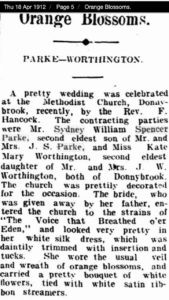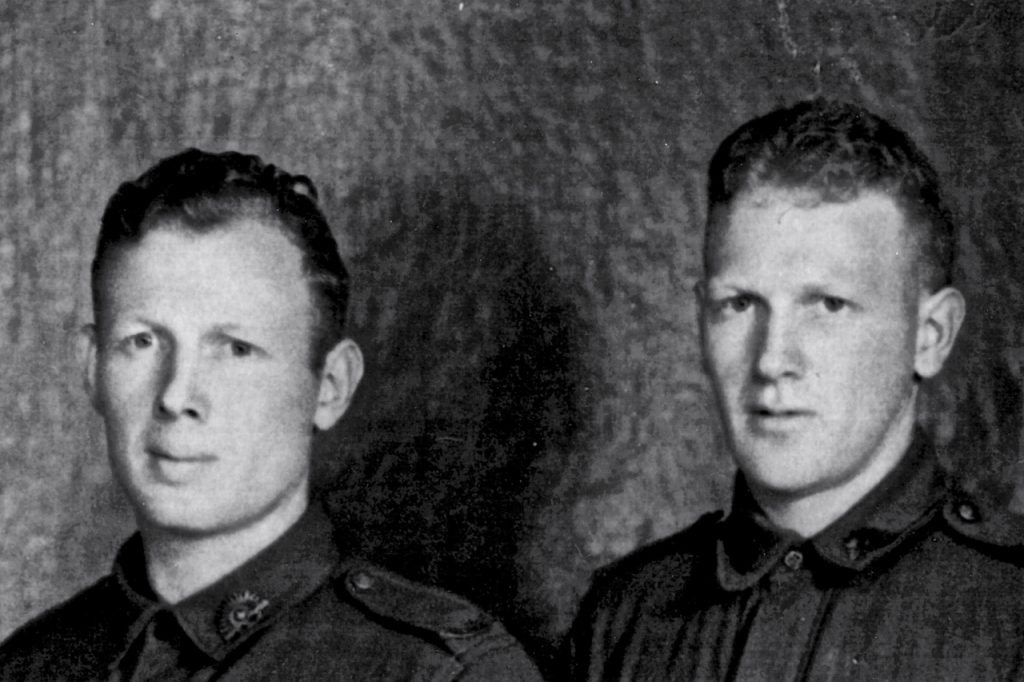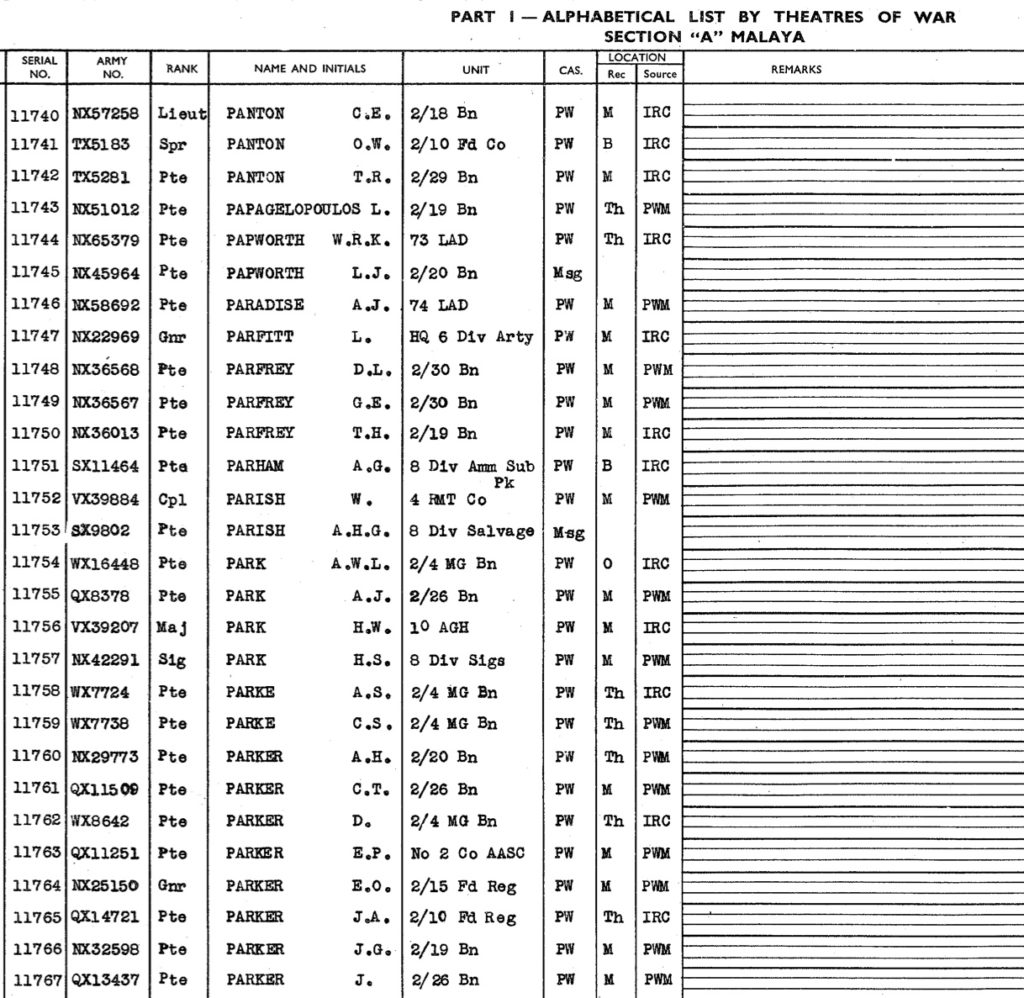The Soldier's Details

- Surname:
- Parke
- First Name:
- Albert Sydney
- Nick Name:
- Bert, Major or Buff
- Rank:
- Private
- Regimental #:
- WX7724
- Company:
- ‘A’ Company
- Enlisted:
- 10.08.1940
- Discharged:
- 23.05.1946
- DOB:
- 3.07.1914
- Place of Birth:
- Donnybrook, Western Australia
- Father's Name:
- Sydney Spencer Parke
- Mothers's Name:
- Kathleen Mary Parke
- Religion:
- Methodist
- Pre-war Occupation:
- Orchard Worker
- Singapore:
- Selarang Camp Changi
- Force:
- ‘A’ Force Burma, Green Force, No. 3 Battalion
- Camps Thailand:
- Tamarkan; Nacompaton; Bangkok
- Camps Burma:
- Victoria Point, Kendu 4.8 km, Thetkaw 14 km, Meiloe 75km, Khonkan 55km (medical orderly from 7.7.1943-19.10.1943), Aungganaung 105km
- POW#:
- 1530
- Return Details 1945:
- Thailand‐Singapore by aircraft; Singapore-Perth, no details are known
General Description

Quorn, SA. 11 October 1941. ‘A’ Company members, 2/4th Machine Gun Battalion en route from Woodside Camp to Alice Springs. L-R Albert (Bert) Parke WX7007, Edward George (Eddie) Burton (died of illness 21 February 1945 Sandakan) Charles Spencer (Charlie) Parke and Eric Joseph Holst WX8678 (perished Sandakan March 1945).
Bert Parke was born the third child of seven children to parents Syd and Kathleen Parke. Syd (Snr) was a railway guard for WAGR in Bunbury and the children attended school there. Poor Bert became a target of bullying in the school yard. In retaliation he filled his pockets with stones to keep the bullies at bay. He received a thrashing from a teacher for this, and when Bert offered his explanation about the bullies his teacher gave him an extra thrashing saying “bullying made men tough!” So began Bert’s dislike and distrust for people in authority. He earned the nickname ‘Major’ from his school years – family and close friends continued use of ‘Major’ until Bert’s death. (from Parke family history)
Below: notice of 1912 Parke marriage.

Albert left school aged 13 years to go to work. His first job was ringbarking trees for Mrs Kelly, a local artist. Later he went to work for his three uncles at Donnybrook, Gordon, Pat and George Parke. They were developing orchards. Later Albert took on the debt of a repossessed farm at Nannup. By the time he enlisted the farm was paying its way – however the law was farmers were not allowed to enlist. To get around this, Bert signed his farm over to his brother Jack. The farm was not worked during the war years and repossessed by the bank and lost.
The Parke brothers enlisted on the same day 10/8/1940.
Following enlistment Bert spent a month at Melville Training Depot. In September he was sent to Northam to 2nd Depot Battalion, then 3rd Depot Battalion. On 4 December 1940 he was transferred to 2/4th all the while at Northam.
He married Dulcie Jean Turnock at the Methodist Church in Northam 1 March 1941. Unlike many men at Northam, his bride was for much of that time, close by living with her parents at 8 Stoke Avenue.
Albert managed 10 days leave in July 1941 a week before leaving for South Australia.
On 12 December 1941, their first child, Leslie Albert was born.
When ‘Aquatania’ arrrived from Sydney and anchored off Fremantle, Albert was one of many men who went AWOL. Having been gone from WA about 6 months and now heading for ‘the Front’ (destination unknown) the 2/4th anticipated leave to see loved ones. But all leave was cancelled. Men were desperate – Bert was gone from 2pm 15 January, arriving back at 12pm the next day before his ship sailed! No doubt he sought to see his wife and son.
He sailed on the ‘Aquitania’ and finally disembarked in Singapore on 24 January, 1942.

Following capitulation of Allied Forces in February 1942, Bert became POW of Japan at Selarang. In May 1942, he joined the first work Force to leave Singapore to work on the Burma end of Thai Burma Railway – ‘A’ Force Burma, Green Force No. 3 Battalion.
‘A’ Force made up of 3,000 POWs sailed out of Singapore for south west Burma – to Victoria Point (21 May 1942) where the POWs would work to repair and enlarge the airfield before heading for the most northern point of the to-be-built Burma-Thai Railway.
Green Force included a large number of 2/4th men. They were the first Australian work Force on the Railway – starting at Kendau 4.8km Camp, Burma on 1 October 1942 and would work there until 1 December 1942. Green Force would finally complete their effort on the rail at the end of December 1943. He worked from 7 July 1943 to 19 October 1943 as an Orderly at Khonkan 55km Camp – established as a hospital. Please read further about Khonkan Hospital Camp.
The Japanese then began moving all POWs working in Burma south to one of about 4-5 large Camps in Thailand. Bert was first sent to Tamarkan, Thailand, later to Nacompaton from where he remained and was recovered at the end of the war and taken to Bangkok to fly to Singapore.

Albert returned to Perth from Brisbane by train on 21 October 1945. He was discharged on 23 May 1946 with 90% disability due to corneal scarring in both eyes. He also suffered a damaged knee cap having been kicked by a Japanese guard from a rail bridge in Burma.
In later life, he suffered skin cancers – wearing only a ‘Jap happy’ did not provide essential protection!
Determined to overcome his physical injuries Bert again took up farming – his family grew to 3 sons. As a successful farmer he was able to assist his three sons into farming,
Albert Parke relayed the following many years ago to Ossie Trigwell, brother of Vern Trigwell. The story and details have been prepared by Sally Kenton (January 2017)
You can read about Vern Trigwell.
“What happened at the 75 kilo Camp was more or less as follows –
‘On a working party carrying poles, a Jap was yelling his head off. If I hadn’t had my foot in my mouth it would never have happened, for I told him to shut his so and so mouth and went into a bit of his pedigree, which he understood! He was standing on the other side of the log pile and I received a wallop in the stomach and shoulder laying me low with a bellyache and put me into hospital with nothing to eat for 14 days.
I was just starting to take a drink when the Japs had a blitz, entering the hospital I was considered fit – of the 70 hospitalised men the Japanese half reduced the number of men to remain. I left the hospital after a drink at midday. It was a very slow trip, about 250 metres in about five hours finally arriving at dark.
I should say a world record.
Next morning I could not swallow and all that day had no food. So, that night Vern Trigwell and Bert Wall (at that time were working in the Jap’s kitchen) decided to pinch a tin of steak and kidney pie that they heated and brought to me. I just about ate the Dixie as well! They had endangered themselves for me.
Thank you Vern and Bert!
I did no further work at the 75 and the boys moved out a week or so later to the 105 kilo I went up by foot about 4 weeks later, just as it began to rain. It rained more or less continuously over the next 3 months with 200+ inches at Three Pagoda Pass. We faced continual rain accompanied by malaria, ulcers, diarrhoea and other injuries and illnesses.”
Les Park, son of Albert provided the following information for the Park Family History – we are grateful and thank you!
During the many hours, days and weeks father and son worked, Les wrote:
His father was disgusted with the stupidity of many officers (they suffered from over education and under intelligence). Albert maintained the Battle for Singapore should have been won – or at least a lot more damage inflicted upon the Japanese army. During the height of the battle an officer in-charge of re-supply of ammunition, with a truck-load of ammunition on stand-by, insisted on a requisition form signed by an officer be presented! It was pointed out that all the officers in that area were either dead or missing – the Officer In-Charge informed them that according to the training manual, some reinforcement officers would be sent from GHQ and only when they arrived and signed the form, would he then issue the ammunition!
Bert’s other major complaint was again about the officers. Whilst working on the Burma-Thai Railway the officers were not required to work – a status quo the officers liked. Bert thought if the officers had been made to work alongside their men, there may well have been more uprisings and escapes, or at the very least, more hands to share the work load.
Officers received much higher pay rates than the working POWs, and in most instances the Doctors, and sometimes the Officers themselves, insisted on pooling monies to purchase desperately needed food and medical supplies for the camp, especially for the sick. The sick were not paid at all – Japanese rule ‘No work no food’ and not allocated food rations from Japanese, or at the very best they were allocated a meagre amount of food. To begin to restore their health, or at least give the very ill a chance of surviving, the very large numbers of sick men throughout the Burma-Thai Railway they required food. Food would provide the strength to overcome even the simplest illnesses for which there were no medical supplies available.
Tamarkan, Thailand and the other camps south at least were able to provide better quality and more food – the Japanese needed to ‘fatten up’ the POWs because they now needed a ‘fit’ work force to send to Japan. The very sick, they were left behind to die in Burma, cared for by POW medical staff.
Albert Sydney Parke died 1 May 1994.
Camp Locations:
- Selarang Camp Changi - Singapore
- Nacompaton, Nakom Pathom Hospital - Thailand
- Tamarkan, Tha Makham 56k - Thailand
- Aungganaung,105Kilo - Burma
- Kendau, Kandaw, 4 Kilo - Burma
- Khonkan, 55Kilo Hospital 360k - Burma
- Meilo, 75 Kilo, 340k - Burma
- Victoria Point, Kawthoung - Burma. \'A\' Force, Green Force No. 3 Btn




